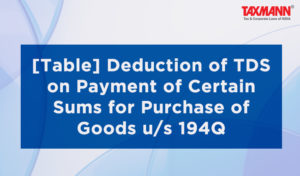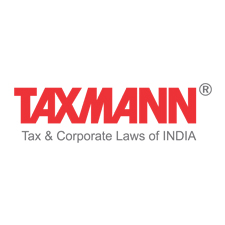[Table] Deduction of TDS on Payment of Certain Sums for Purchase of Goods u/s 194Q
- Blog|Income Tax|
- 4 Min Read
- By Nidhi Rai
- |
- Last Updated on 11 May, 2022

Provisions at a Glance
| Payment from which TDS is to be deducted | Payment of any sum to any resident ‘seller’ for purchase of any goods of the value or aggregate of such value exceeding fifty lakh rupees in any previous year.
The provisions of section 194Q of the Act shall not be applicable in relation to transactions in securities and commodities which are traded through recognized stock exchanges or cleared and settled by the recognized clearing corporation, including recognized stock exchanges or recognized clearing corporation located in International Financial Service Centre (IFSC) [CBDT’s Circular No.13/2021, dated 30.06.2021] In respect of purchase of power through power exchanges, CBDT has clarified, vide Circular No. 13/2021, dated 30.06.2021, that TDS under section 194Q will not apply to transactions in electricity, renewable energy certificates and energy saving certificates traded through power exchanges registered in accordance with Regulation 21 of the CERC. Under section 194Q of the Act, a buyer is required to have total sales or gross receipts or turnover from the business carried on by him exceeding ten crore rupees during the financial year immediately preceding the financial year in which the purchase of good is carried out. Since this condition would not be satisfied in the year of incorporation, the provisions of section 194Q of the Act shall not apply in the year of incorporation. [CBDT’s Circular No.13/2021, dated 30.06.2021] |
| Deductee/Payee | Any resident seller
If, for any reason, tax has been collected by the seller under sub-section (1H) of section 206C of the Act, before the buyer could deduct tax under section 194-Q of the Act on the same transaction, such transaction would not be subjected to tax deduction again by the buyer. [CBDT’s Circular No. 13/2021, dated 30.06.2021] The provisions of section 194Q of the Act shall not apply on purchase of goods from a person, being a seller, who as a person is exempt from income tax under the Act (like person exempt under section 10) or under any other Act passed by the Parliament (Like RBI Act, ADB Act etc.) [CBDT’s Circular No. 13/2021, dated 30.06.2021] |
| Threshold limit for non-deduction of TDS | Rs. 50,00,000 |
| Tax base i.e. amount on which TDS % is to be Applied for computing TDS to be deducted | When tax is deducted at the time of credit of amount in the account of seller and in terms of the agreement or contract between the buyer and the seller, the component of GST comprised in the amount payable to the seller is indicated separately, tax shall be deducted under section 194Q of the Act on the amount credited without including such GST.
However, if the tax is deducted on payment basis because the payment is earlier than the credit, the tax would be deducted on the whole amount as it is not possible to identify that payment with GST component of the amount to be invoiced in future. Tax is required to be deducted at the time of payment or credit, whichever is earlier. Therefore, before purchase return happens, the tax must have already been deducted under section 194Q of the Act on that purchase. If that is the case and against this purchase return the money is refunded by the seller, then this tax deducted may be adjusted against the next purchase against the same seller. No adjustment is required if the purchase return is replaced by the goods by the seller as in that case the purchase on which tax was deducted under section 194Q of the Act has been completed with goods replaced |
| Applicable Rate of TDS | 0.1% |
| Rate of TDS if PAN/Aadhaar is not furnished by deductee | 5% |
| Whether provisions of higher TDS rates for non-filers of ITR (section 206AB) is applicable to section 194Q? | Yes. |
| Time of deduction | At the time of credit of such sum to the account of the seller or at the time of payment thereof by any mode, whichever is earlier. |
| Whether payee can obtain certificate u/s 197 for no deduction of TDS or deduction of tax at a lower rate | No. |
| Whether payee can avail the facility of nil deduction of tax by submitting self-declaration in Form No. 15G/Form No. 15H? | No. |
| Adjustment of excess/deficiency of TDS deduction from subsequent deduction in same FY | No. |
| Whether Tax Deduction and Collection Account Number required to be obtained by deductor to deduct TDS u/s 194Q? | Yes. |
| Furnishing of TDS returns/ statements by deductor to Department | TDS returns to be filed in Form No. 26Q
Rule 31A requires deductor-buyer to furnish in Form No.26Q the particulars of amount paid or credited on which tax was not deducted in view of sub-section (5) of section 194Q with effect from 1st day of July, 2021. i.e. to say particulars of cases where TDS was not deducted as (I) TDS is deductible under any other provisions; or (II) is collectible under the provisions of section 206C other than a transaction to which sub-section (1H) of section 206C applies [Write “S” in Column [424](penultimate Column)(Note No. 14 of Form 26Q)] |
| TDS Certificate to be issued by deductor to deductee | Form No. 16A |
| Disallowance under section 40(a) | Yes – if purchases are revenue expenditure and claimed as deduction. |
Disclaimer: The content/information published on the website is only for general information of the user and shall not be construed as legal advice. While the Taxmann has exercised reasonable efforts to ensure the veracity of information/content published, Taxmann shall be under no liability in any manner whatsoever for incorrect information, if any.




 CA | CS | CMA
CA | CS | CMA
